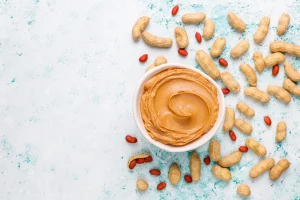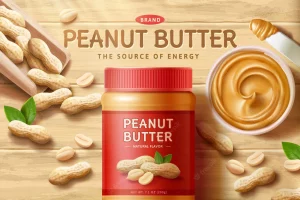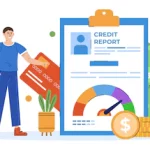Peanut butter has always been a favorite food of many – it’s simple, filling, and can be enjoyed in many different ways. But what about peanut butter and student loans?
Student loans are a lot like any other type of loan. You need to have good credit, be solvent, and have a good income to qualify for them. But unlike other types of loans, student loans offer very low interest rates. And if you have excellent credit, you could get a loan with no interest at all!
But these great rates come with some risks. For example, if you don’t pay your student loans on time, the interest will start to add up quickly. And worse yet, if you default on your loan, the government can seize your assets and garnish your wages.
Fortunately, there are ways to mitigate those risks. For example, you can work with a personal finance adviser to get tips on how to manage your money better. Or you could consider taking out a student loan that has lower interest rates but longer terms so that you won’t have to worry about paying off your debt as quickly as possible. However, no matter what you do, it’s important to stay informed about the latest student loan
What are peanut butter student loans?
Peanut butter student loans are a type of student loan that are made available through the government. These loans are designed for students who are pursuing a degree in a field that requires a certification or license from a government agency.
The benefits of peanut butter student loans include low interest rates and flexible repayment options.
The drawbacks of peanut butter student loans include that they are not as popular as other types of student loans and they may require tougher credit requirements than other types of loans.
The different types of peanut butter student loans
There are several types of peanut butter student loans, each with its own unique benefits and drawbacks. We’ll take a look at the three most common types of peanut butter student loans, and what you need to know about them.
Peanut Butter Federal Stafford Loans:
This type of loan is the most popular and widely available, and is available to students who have good credit and a valid Social Security number. The interest rate on these loans is fixed at 6.8%, which is low compared to other types of loans. The downside is that these loans have variable interest rates, which can rise suddenly if the market rate increases. There are also penalties for late payments, so it’s important to keep track of your payments carefully.
Peanut Butter Private Loan:
This type of loan is usually more expensive than Federal Stafford Loans, but has a lower interest rate and no early repayment penalties. These loans are best for students who don’t have good credit or who have a difficult time securing traditional loans. Private lenders generally require a higher down payment than Federal Stafford Loans, so make sure you have enough money saved up before you apply.
Peanut Butter Consolidation Loan:
If you have multiple Federal Stafford
Pros and Cons of peanut butter student loans
Peanut butter student loans can be a great option for people who want to get an education but don’t have the money to pay for it. However, there are also some cons to taking peanut butter student loans. First, peanut butter student loans are not as popular as other types of loans, so there may be less competition for them. Second, peanut butter student loans may not be as good a deal as other options. For example, some schools offer scholarships that are worth more than the interest on a peanut butter student loan.
How to get a peanut butter student loan
Peanut butter student loans are a great way to get the education you need and still have some money left over. Here are four tips for getting a peanut butter student loan:
1. Start by searching online for lenders that specialize in peanut butter student loans. There are many to choose from, so be sure to do your research.
2. Consider borrowing money through a private lender. These lenders are less regulated than government-sponsored lenders, so you may be able to get a lower interest rate and more flexible terms.
3. Check out government-sponsored lenders first. Many of these lenders offer low interest rates and flexible terms, making them a good option if you qualify for them.
4. Don’t forget about scholarships and grants! Many colleges and universities offer scholarships specifically for students with peanut butter loans, so be sure to look into your options before applying for a loan.
What is peanut butter?
Peanut butter is a type of spread made from ground nuts and peanut butter. It can be used as a sandwich filling, as a dip or spread, or as a topping for bread. Peanut butter can also be used in baking recipes.
Peanut butter student loans review
If you’re looking for an easy way to pay for college, consider taking out a peanut butter student loan. These loans are perfect for people who need short-term financing to cover tuition costs while they finish their degree.
There are several things to keep in mind when applying for a peanut butter student loan. First, make sure you have enough money saved up to cover the interest payments on the loan. Second, make sure you understand the terms of the loan before you sign anything. Finally, be prepared to repay the loan in full when you graduate from college.
If you’re interested in applying for a peanut butter student loan, be sure to visit one of our online lenders today!
Types of peanut butter
Peanut butter is one of the world’s most popular and versatile foods. It can be used in many different ways, including as an ingredient in food, a spread on bread or toast, or even as a standalone meal. Peanut butter is also a popular choice for student loans because it is affordable and versatile. Whether you are borrowing to pay for school expenses or to help you get started in your career, peanut butter loans are a great option.
There are several types of peanut butter loans available to students. The most common type of peanut butter loan is a direct loan. Direct loans are unsecured and come with fixed interest rates that change over time but generally remain low compared to other types of loans. For example, the standard interest rate on a direct loan is 3.9%. This means that the amount you owe will increase by 3.9% each year, but there is no need to worry about making payments back until you reach your debt limit. Another type of peanut butter loan is an installment loan. Installment loans are secured and have lower interest rates than direct loans but require borrowers to make monthly payments back over a set period of time. For example, a borrower might take out an installment.
What are the ingredients in peanut butter?
Bloggers may want to know the ingredients in peanut butter, as students may be interested in knowing whether or not peanut butter qualifies as a low-cost loan option. Peanut butter is made of: peanuts, sugar, salt, and oil.
What are the health benefits of peanut butter?
Peanut butter is a healthy food that can provide many health benefits. Some of the health benefits of peanut butter include: providing antioxidants, helping to lower blood pressure, fighting against heart disease, reducing the risk of type 2 diabetes, and improving cognitive function. Additionally, peanut butter can help reduce the risk of weight gain and improve bone health.
The best time to invest in peanut butter student loans
Peanut butter student loans are a great investment for anyone looking to make money. The interest rates are low and the repayment terms are flexible, so you can afford to make payments that fit your budget. Plus, there’s no need to worry about credit history when you take out a peanut butter student loan, which is an advantage over other types of loans.
What are peanut butter student loans?
Peanut butter student loans are a type of student loan that are specifically designed for students who are interested in pursuing a career in the food industry. These loans are offered through a number of different lenders, and they typically have lower interest rates than other types of loans. One important thing to keep in mind is that peanut butter student loans are not available to all students – you need to be eligible based on your educational and job goals.
How do peanut butter student loans work?
If you’re thinking about taking out student loans to cover your tuition costs, there are a few things you should know about peanut butter student loans. First, peanut butter student loans are typically unsecured loans, which means that the lender has no recourse if you can’t repay the loan. On the other hand, this type of loan is generally easier to get than other types of loans, and the interest rates are lower. Second, peanut butter student loans typically have shorter repayment periods than other types of student loans. Finally, peanuts are a great source of protein and healthy fats, so eating peanut butter on a regular basis can help to improve your diet while you’re studying.
The bad news about peanut butter student loans
Peanut butter student loans may have some bad news for you.
First, peanut butter student loans are not as good as other types of loans.
Second, peanut butter student loans carry a higher interest rate than other types of loans.
Third, peanut butter student loans can take longer to pay back than other types of loans.
Fourth, peanut butter student loans can have more expensive terms than other types of loans.
The good news about peanut butter student loans
If you’re considering a peanut butter-based degree, it might be time to rejoice! Thanks to the recent trend of student loan refinancing, there are now some pretty sweet deals out there for borrowers with peanut butter degrees. Here’s what you need to know:
-There are a number of companies that offer refinancing options for peanut butter borrowers. This means that you can take out a smaller loan with a lower interest rate and have more money left over to use for your education.
-Refinancing can be an incredibly cost-effective way to pay off your student loans. Assuming you qualify for a good refinancing deal and don’t incur any additional fees, you could save as much as $2,000 on your total debt burden.
-Even if you don’t qualify for a refinancing deal right now, keep in mind that the market is always changing. There’s a good chance that something better will come along in the future – so don’t give up hope!
What are the consequences of not paying peanut butter student loans?
If you don’t pay your peanut butter student loans, there are consequences. Here are a few:
1. Your credit score could be impacted. If you have delinquent peanut butter student loans, your credit score will take a hit. This could make it harder to get approved for a loan in the future, and it could also impact your ability to get a mortgage or car loan.
2. You may have to pay more in interest payments. If you haven’t paid your peanut butter student loans in a while, the lenders may decide to put them into forbearance or a different type of repayment plan that results in higher interest payments. This can add up quickly, and it could mean that you end up paying more overall than if you had just paid the loans off on time from the beginning.
3. You may have to file for bankruptcy. If you can’t afford to pay your peanut butter student loans and they continue to come due, your lender may decide to file for bankruptcy against you. This could mean that you lose all of your assets – including your home – and you may have to start over from scratch when it comes to getting a new job and building your credit rating back
What is peanut butter?
Peanut butter is a type of nut, made from ground peanuts, that is often used in cooking and as a snack. It is also used as a currency in some parts of the world. Peanut butter loans are a type of loan that allow people to borrow money from a lender to purchase goods or services. They are also known as peanut butter credit cards.
Peanut butter loans are an option for people who need quick cash but do not have good credit. They are also an option for people who want to purchase goods or services but do not have enough money to pay for them with a traditional credit card.
If you are looking for a fast and easy way to get money, a peanut butter loan might be the perfect solution for you.
What are the pros and cons of peanut butter loans?
Peanut butter loans are a great way to get the money you need for school without having to go into debt. They are also a good option if you have poor credit because peanut butter loans have low interest rates. However, there are some cons to peanut butter loans that should be considered before taking them out. First, peanut butter loans are not as popular as other loan types, so they may be difficult to find. Second, peanut butter loans have lower minimum requirements than other loan types, so if you don’t have much money saved up, you may not be able to get one. Finally, peanut butter loans only last for three years, which means that you will likely have to start repayment sooner than if you took out a more traditional loan type.
What are the different types of peanut butter loans?
There are a few different types of peanut butter loans, which can depend on your eligibility and other factors. Most of these loans are government-backed and come with varied terms and interest rates.
1. Direct Subsidized Loans: This type of loan is available to students who demonstrate financial need and have good credit. The interest rate is fixed at 3.4%, and the loan covers the full cost of tuition, fees, and textbooks. You must attend a qualifying school, and you must repay the loan over a period of 10 to 12 years.
2. Direct Unsubsidized Loans: This type of loan offers lower interest rates than the subsidized version, but it comes with more restrictions. You must have good credit and demonstrate financial need, among other things. The interest rate for this type of loan is fixed at 4.6%. You must also repay the loan over a period of 10 to 12 years.
3. Perkins Loans: These loans are available to students who have demonstrated financial need and excellent academic record. The interest rate for Perkins Loans is 5%. The maximum amount you can borrow is $5,500 per year, and you must repay the loan over a period of 10 to 12 years
How much peanut butter student loans cost?
Student loans can be expensive, and peanut butter student loans are no exception. When comparing average costs for peanut butter student loans from different lenders, the averages range from $5,950 to $11,600. Keep in mind that these costs are just averages- your specific loan may cost more or less depending on your individual situation.
If you’re considering taking out a student loan to pay for school, it’s important to compare different options and see what works best for you. The cost of peanut butter student loans can vary significantly, so it’s important to do your research before signing anything.
What are the repayment terms for peanut butter student loans?
There are a few repayment terms for peanut butter student loans. The most common terms are 10 years, 15 years, or 30 years. The length of the repayment term will depend on the loan amount, credit score, and other factors.
Conclusion
If you’re looking for a nutritious and delicious snack that can help you manage your money, reach for some peanut butter. In this peanut butter student loans review, we’ll explore how peanut butter can be a valuable tool when it comes to debt reduction. We’ll also provide tips on how to buy cheap peanut butter online so that you don’t have to break the bank. So what are you waiting for? Start stocking up on PB&J sandwiches today!






